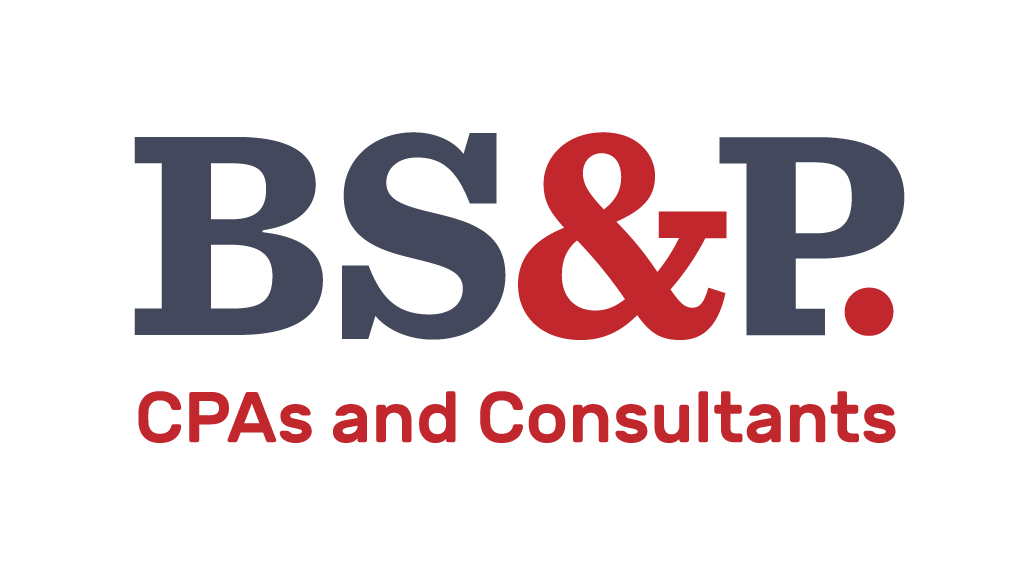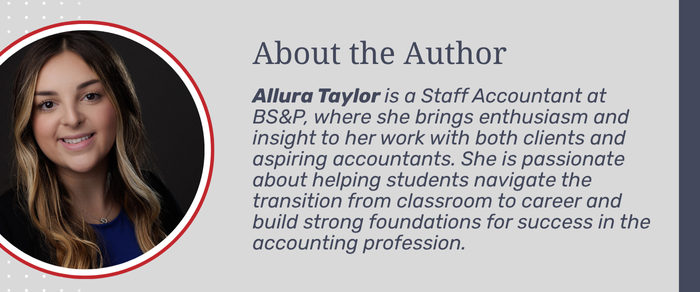Welcome to the second installment of “Your CPA Starter Pack”, a three-part series by BS&P’s Staff Accountant Allura Taylor that breaks down what you can expect-and how you can thrive-as you start your career in accounting!
The Certified Public Accountant (CPA) exam is a major milestone for aspiring accountants. It’s known for being rigorous but passing it opens doors to respected positions in public accounting, corporate finance, government, and beyond.
Whether you’re considering sitting for the exam or just want to understand what it involves, here’s what you should know, from exam structure to study strategies. The biggest takeaway is that everyone’s journey is different and find what works best for you!
📚 Overview of the CPA Exam
The CPA exam is administered by the American Institute of Certified Public Accountants (AICPA) and is designed to assess knowledge and skills required for entry-level CPAs.
✅ Eligibility Requirements
Requirements vary by state but usually include:
- A bachelor’s degree in accounting or related field
- Completion of 150 credit hours of education
- Specific coursework (auditing, taxation, business law, etc.)
🧩 Structure of the CPA Exam
The CPA exam consists of four sections, each testing different competencies:
- AUD – Auditing and Attestation
- Topics: Audits, reviews, ethics, professional responsibilities, and internal controls
- Skills tested: Planning, evidence evaluation, forming conclusions, and reporting
- FAR – Financial Accounting and Reporting
- Topics: GAAP, financial statements, governmental and not-for-profit accounting
- Skills tested: Analysis, application, and understanding of financial accounting concepts
- REG – Regulation
- Topics: Federal taxation (individual, entity), business law, ethics
- Skills tested: Applying tax law, understanding legal responsibilities, and business regulations
- Discipline of your choice – BAR, TCP, or ISC
- BAR (Business Analysis and Reporting)
- BAR is ideal for candidates interested in financial analysis, reporting, and advisory roles, such as those in corporate accounting or financial planning.
- Topics: Financial analysis, data analytics, performance management, and reporting
- Skills tested: Evaluating and interpreting business data and making decisions
- TCP (Tax Compliance and Planning)
- TCP is tailored to those aiming for careers in taxation, focusing on tax compliance, research, and planning for individuals and entities.
- Topics: Individual tax compliance and planning, entity taxation, state taxation, tax research and ethics, and other tax planning
- Skills tested: Application of tax laws to practical scenarios, research using the IRC, strategic tax planning for individuals and businesses
- ISC (Information Systems and Controls)
- ISC is for candidates interested in IT audits, cybersecurity, and systems controls, bridging the gap between accounting and technology.
- Topics: Information systems, IT infrastructure, data management, security, and IT risk assessment
- Skills tested: Understanding of IT controls in financial environments, risk assessment, internal control design, application of audit procedures in IT context
🧪 Exam Format and Testing Environment
- Each section is 4 hours long and is comprised of 5 testlets!
- Contains:
- Multiple-choice questions (MCQs)
- Task-based simulations (TBS) – These are the real-world problem-solving questions.
- Exams are taken at Prometric testing centers or via remote proctoring (in select jurisdictions).
You must pass all 4 sections within 30 months of passing the first one. The best way to think about this is that your “clock” doesn’t start until you receive that first pass! This is why most people recommend taking the exam that you believe will be the hardest for you first. This ensures that if you need to retake you are not under a time crunch or give yourself added stress. Personally, I chose to start with AUD, knowing it would be challenging since my work experience is primarily in tax.
📖 Study Tips
- Choose a Good Review Course
– Becker, Wiley, Roger CPA, and Gleim are a few examples. These platforms have free trials so you can see what they offer and if it works for your learning style. I personally use Becker and have also found that joining the Becker Facebook study groups has been helpful. You can post questions and people can comment directly, whether it be fun mnemonics to help remember a topic or Becker tutors who comment technical solutions to the problem. - Follow a Study Plan
– Aim for 100–150 hours per section. Study consistently: 2–3 hours/day over several weeks. - Use Active Recall and Spaced Repetition
– Flashcards, practice quizzes, and revisiting tough topics help retention. I have found that going through about 40-50 MCQs per day during my final study has been very helpful! - Simulate Exam Conditions
– Do timed mock exams to practice stamina and time management. It is very easy to get burnt out during the MCQs, so you want to learn how to get through those steadily to conserve brain power for the TBS! - Focus on Understanding, Not Memorizing
– The exam tests applied knowledge, not just facts. There will be some topics that will be strictly memorizing but a majority will be on your understanding and application.
🧠 Testing Day Tips
- Arrive Early
– Be at the testing center at least 30 minutes ahead. Bring valid IDs. - Stay Calm Under Pressure
– Manage your time: don’t get stuck too long on any one question. You can flag those you are unsure of and come back to them in that testlet. Once you move on to a new testlet though, you cannot go back. - Use the Breaks Wisely
– You’re allowed scheduled breaks. Take them to recharge! Bring your favorite snack. My exam go to snacks are an Alani energy drink, Nerd Clusters, and a protein bar! - Read Carefully
– Some questions are designed to test your precision in understanding and trick you. - Trust Your Prep
– Don’t second-guess too much; go with your instincts if you’re unsure.
🎓 Final Thoughts
The CPA exam is tough, but it’s also achievable with the right preparation and mindset. It’s a significant investment of time and effort but passing it proves your dedication, professionalism, and expertise in accounting.
If you’re early in your career, start planning now: meet educational requirements, choose your review course, and develop disciplined study habits. The sooner you start, the closer you are to becoming a licensed CPA.
Don’t miss the final installment of Allura’s “Your CPA Starter Pack Series” – get it sent straight to your inbox here!

